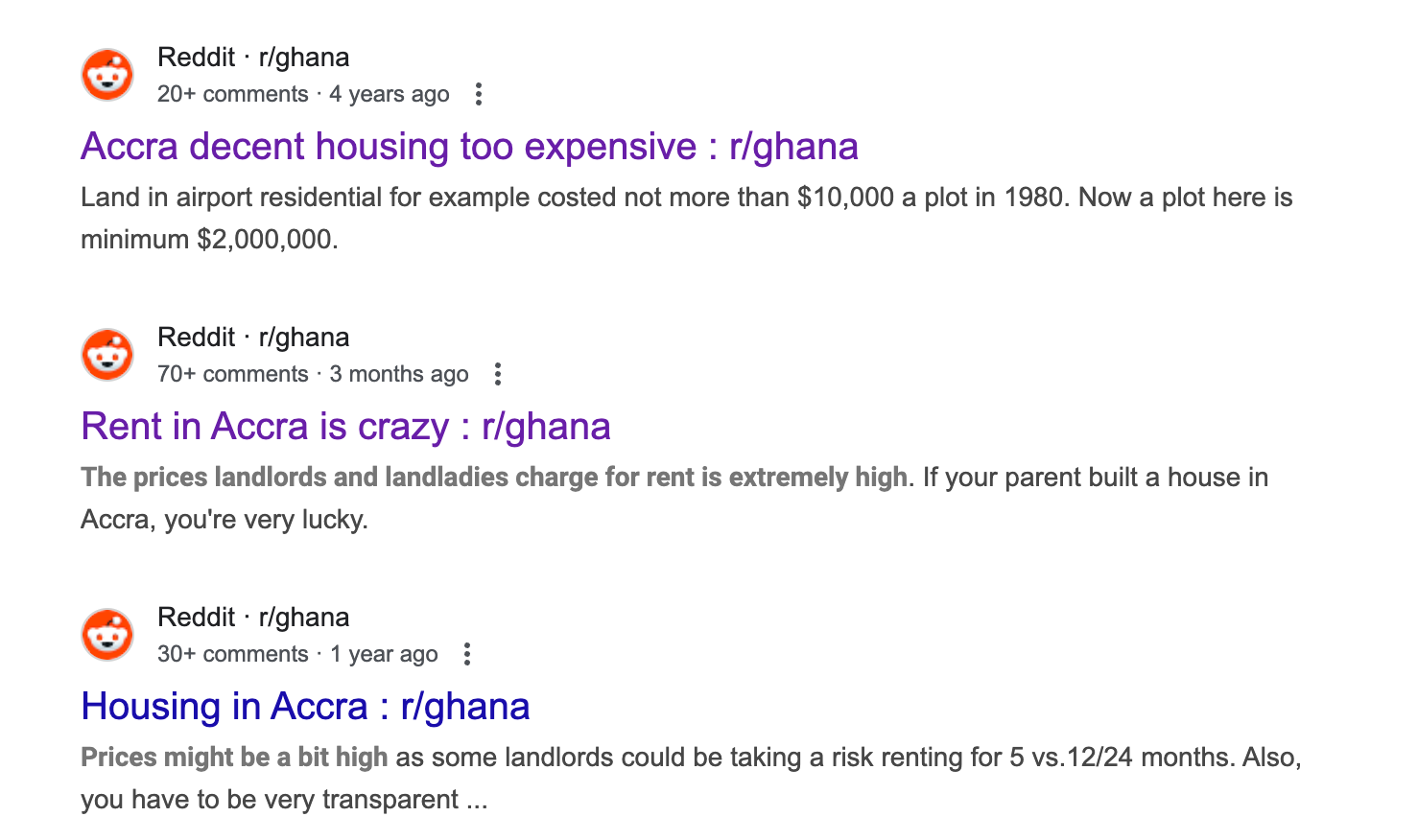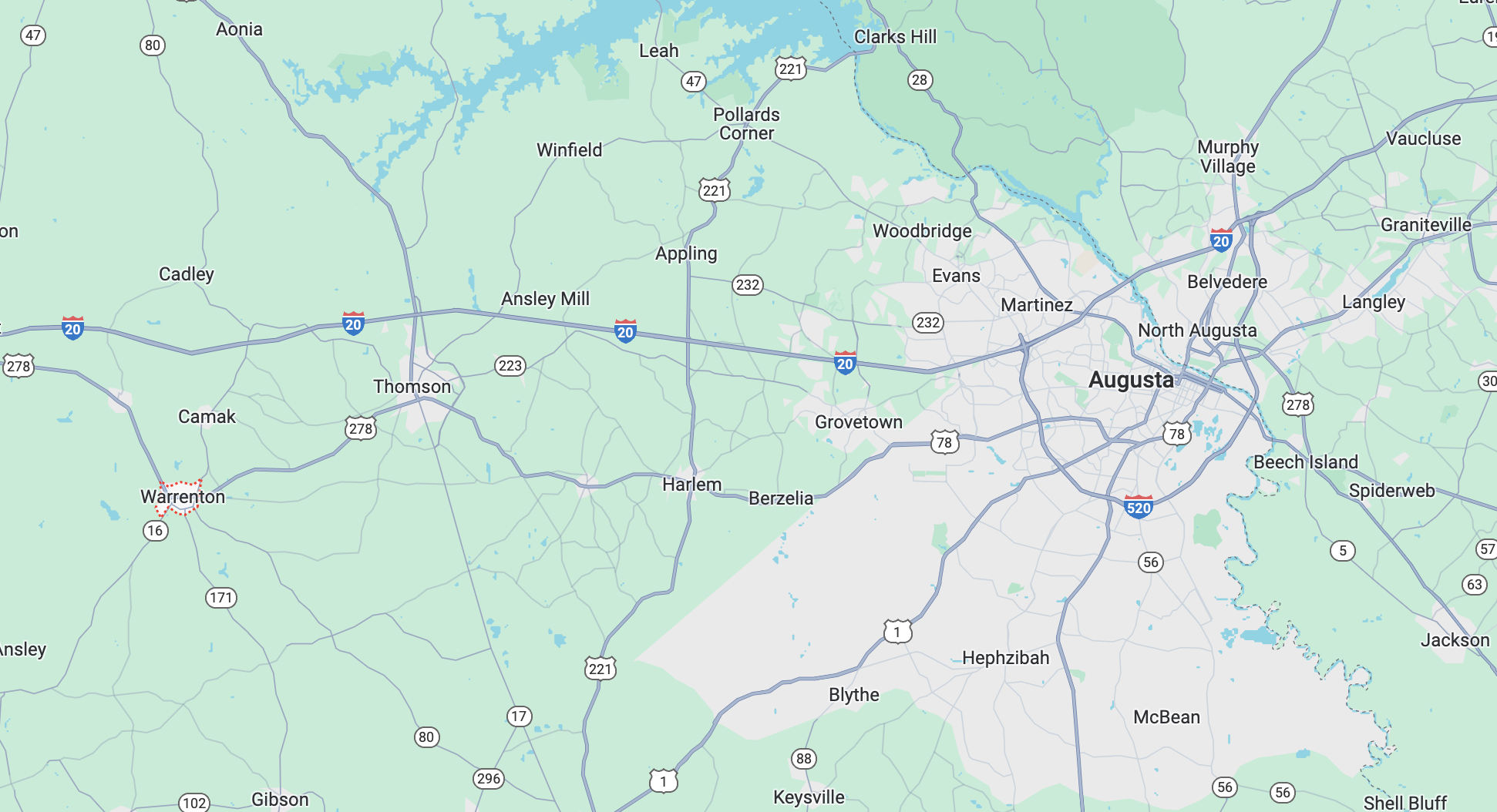
Increased communication, transportation, financialization (connectedness, essentially) are reshaping the world. Though many comment on the specifics such as high housing prices in their specific city, they fail to realize the global picture.
Replace Accra with whatever major city across the world relative to the local incomes. (Note I am surprised that their English grammar is quite good compared to Atlantology or Nairaland Forum). I chose Accra because people would be surprised by similar phenomena in Western Africa.

Stratification
Mainly, it applies to ability and wealth. We see from some examples that it is true:
- In school, smart people don’t spend time with stupid people
- A talented person in X industry joining a group meeting with a bunch of noobs would be annoyed. Anyone talented and who can self-learn doesn’t want to hang out around noobs, leaving them to themselves. Talented people will teach talented learners but not a giant crowd of noobs unless they’re elevated to a speaker position (like at a conference).
- People don’t use social media anymore because the people on there are too low quality (dating apps too). People don’t engage with alumni groups (tend to be full of unemployed people). Public networking events offer few opportunities.
- Tens work with other tens. (Schwarzman)
- Meeting people in real life for a job is useful, but not as useful in the past because you can determine someone’s level of competence digitally and have them relocate, so why go to in-person networking events? (increased communication and transportation)
- However, life is high dimension and the internet is low dimension, so you may still want an in-person presence to determine fit.
- Q: What percent difference in ability and learning rate is the largest that can be between two people for an engagement to not be worth it?
Without a sort of filtering mechanism, groups become enshittified, causing skilled people to leave. USA is not doing a great job of filtering (visas vs border situation).
Causes:
- Natural constraints on one’s time. You can’t spend too much time helping unskilled people because that’ll limit your own career.
- Personal feelings (being annoyed by less skilled people).
This concept is closely related to Network Community. When combined with displacement, it means rich people who move into a place don’t hang out with the locals.
Group Feeling and Affection are Inadequate Compared to Competence and Skill

There are some phrases that capture this well: “You can’t eat love,” and “You can’t spread thanks on bread.” And I imagine many feel this distinct tension with people in their past who they have group feeling for but know that they can’t easily support because doing so reduces their own fitness. And so people stratify based on competence, placing themselves in groups where their addition increases rather than decreases the overall fitness of the group.
In the past, I’d suspect group feeling was highly correlated to group fitness. Old people would still have something to do despite their age. People had more in common with their group than someone of similar ability in another group.
Urbanization causes the increased growth of Augusta, GA, despite it not being a major tier city, as it’s considered big for the area it’s in. This is verified by the increase in stores and traffic. The area around Greenville, SC, has likewise urbanized as well.
It’s something you see in China as well, especially the distinction between government wanting to revitalize the rural area but also promote urban development but the inherent contradictions within. I was reading subreddits about random countries in sub-Saharan Africa, and people described the capital as very expensive (in relative terms). A remark by a friend on how Spain’s small villages were depopulating.
Displacement
- Petit bourgeoisie move from New York or California to cheaper places like Atlanta or Texas. People move from London to Eastern Europe.
- Universities and school cause housing shortages in the area nearby, especially acute in Germany
- Locals in the Canary Islands get priced out by tourists
- Northeasterners move to the American South to retire, increasing housing prices
Causes: remote work, increased information and financialization. You wouldn’t move somewhere if all your wealth became worthless. Corollary: homeless people don’t like to move because they are disconnected from social resources, which they rely on more than the “modern system” of purchasing goods. May explain why people are friendlier in less developed places because friendliness is related to well-being. Nevertheless, being a part of a community is a valuable feeling.
Displacement is associated with older people who have ‘made it’ and are seeking warmer weather. Younger people engage in economic migration.
A way to resolve the contradictions of stratification, economic migration, and displacement may involve recognizing this pattern will continue, but having methods so that those who migrate into an area have stronger community ties with those locally around them. If someone moves into an area, they should become responsible for the well-being of those around them. I cannot see economic migration ending due to the lack of opportunities in smaller areas and the lack of access to certain knowledge, people, resources, and global supply chains.
Economic Migration
- Eastern Europeans move to Germany for work. Mexicans move to the USA. Skilled migrants move from India to Silicon Valley.
Causes: Increased information. Not info itself but the perception of a certain place as “X,” leading large amounts of people to head there. Each place and locale has a global consensus reputation somewhere on the internet space which may not be exactly correct, but it attracts people to a place based on the reputation, who may leave if they decide the place isn’t for them.
Attractors in society are universities, events that draw people in, reputations of a company or country, internet artifacts such as websites, photos, videos, or promotional material.
Places that have certain global reputations either benefit from this labor or get enshittified. Small places lose their human capital. You might be able to gain a lot from one-time interactions, like if a country gains some cheap labor even if they leave later.
Because of displacement + economic migration, you end up with a town full of poor old people while rich newcomers move in for the nature (think of Montana).
Augusta National Golf Club: Bill Gates comes in, does not interact with anyone locally. Closed ecosystem.
Because of economic migration, people end up coming to the USA for studies and work with a certain goal, such as Silicon Valley. But because of stratification, not everyone succeeds. Only some reach the top tier locales in the USA such as starting a startup in Silicon Valley while others get sent to crappy places to work as an office drone.
I think of the desperation of H1B visa students or professors at a second-tier state university. (Put yourself in their shoes. What academic person wants to teach at that type of school?) As someone who is living in the US, I recognize that I don’t have the time pressure a lot of immigrants have.
Network Community
- Rather than whoever is local mattering the most (though it helps to meet people locally), people stratify and their network matters more. You can live in the same town but have hugely different lives based on the supermarkets you go to, the social events you attend, the friends you have, and so on.
Causes: Increased communication, transportation, and stratification.
Global Culture
Everyone has a similar style of life. They live in an apartment or a house. They drive or take transit around. There are supermarkets, which come from certain supply chains, some more global than others. People hang out in air conditioned rooms on the Internet. AirBNB has similar style in different countries.
Caused by increased communication but also increased transportation of material goods.
It was always like this
Even in 1377 when the Muqaddimah was written, Ibn Khaldun noted that those in remote region (Russia, Africa) had a lower level of civilization compared to the temperate zones.
Human culture and civilization increases with increased trade and amounts of people. The one absolute superiority those in more remote places is their sense of group feeling and self-sufficiency, something that in many places has become eradicated as modern culture came in, leaving them on the fringes of modern society.
Poisoning and Metabolic Crises
- Cancer, autoimmune diseases, not nutritious food, decreased testosterone, increased neoplasms, poisons in our environment. Seems to be happening worldwide.
Questions
- How do these trends and low birth rates go together?
- Increased sickness due to modern society, pollution, plastics, and bad food systems. People aren’t physically able have kids.
- Debt-based economic system raises asset prices.
- Suburban wasteland style of urban development makes existing overpriced (car + gas).
- Increased mobility reduces social support due to relocation.
- Producing children is not economically productive or conducive to survival.
- Education raises most people’s level of mental awareness for what is acceptable. Most people aren’t that selfish. Why would they have kids only to have them suffer?
- What are the different “tier lists” in this global economy?
- Most freedom: travel through space, deep under the seas, go to multiple countries, live multiple lives. Health, money, time, mental awareness.
- Least freedom: wage slavery, bad health, lack of education, restricted to one locale just watching things pass by.
- Language barriers still exist. What is the extent?
- For example, is French Canada less affected by Anglophone cultural problems?
- Why did this current state of things not exist in the past? (simple answer: less communication and transportation)
- How might this state of things collapse? What would happen? Could this state of things expand?
- Slow collapse: things just fall apart as people stop maintaining civilization
- Fast collapse: sudden shock/natural disaster, lack of energy production
- Expansion: faster planes, better transportation, new ways of communicating, thinking, and relating to people
- Why do food supply chains not exist locally anymore? (gut feeling: economies of scale, subsidization, monetary reasons)
- If you invented cars and decided that people could get from cars to the supermarket, you wouldn’t make an exception for donkey-drawn carts. ebikes did not exist the 1960s, so why would bikes even be considered at all in that planning when manual labor leads to so much effort and one could drive? it would require seriously necessary foresight to plan a city in a humanistic way that minimized the detrimental effects of cars.
- When goods are produced locally and consumed locally, many of these are of rudimentary quality.
Skills relevant to modern civilization
- Minimalism is important because people are constantly moving from city to city for new opportunities.
- How to have an accurate assessment of multiple types of people since you are meeting so many of them
- How to search for relevant information, how to filter out knowledge and determine what is true and false
- How to make money
- Understanding the shape of the infrastructure and landscape around you
- Knowing the Berlin-Munich railway timetable is more important than knowing a specific mountain in this era
Levels of the Global System
If we define wealth as having a surplus of health, social connections, material assets, mental understanding of society and other people, money, and time, then we can see that being connected to the global system is more beneficial. Any answer to the global system should be stronger than it. The global system could certainly destroy a town of Amish. You can’t “disconnect” from the networked/internet world because it constantly exists and changes around you.
As people have different starting points, someone fleeing violence in South America would consider a stable life, food, and a job as a good outcome. Generally speaking, primary resource extraction appears to be the lowest tier and the richest seem to be highly mobile, flying everywhere on their private jets, going into outer space, and diving deep beneath the ocean. Is there a type of lifestyle that is more rooted that is stronger than this global system? Or is it necessary to have high mobility to acquire a certain amount of global resources and investment?
Life is pretty bad for a lot of people. Health problems, wage-slave labor, and so on. People manage, I guess. Those who say the world is the best it’s ever been and fair haven’t experienced true pain. To minimize the sufferings of others is amoral.
Repeating Patterns
Enumeration/Data/Categorization
Enumeration refers to the pattern of listing out the features of something in a 2D way. Just by joining data can one deduce useful information.
A car has attributes color, license plate, make, model, etc. Joining license plate onto a table that has owner information helps one find that person.
A list of data is all that is needed to describe an object.
When describing OECD trade, people negotiating it are split into different categories and sections.
Layering
Since the production of material goods is concentrated across specific groups, such as the power utility company, the table manufacturing company, the airplane company, the computer company, the car company, no single entity, group, or government’s strength comes from its own power of production.
Rather, other competencies only need to be identified and maintained so that they are not destroyed.
This has a dampening effect as cities of low competency (destroy things, make things dirty) may receive a Whole Foods while a high competency suburb also receives a Whole Foods, giving them similar goods uncorrelated to their abilities. Over time, the low-competency place acts as a sinkhole, destroying things that come to it. I think that these places are somehow economically subsidized by the federal government, allowing the people there to exist.
A key question is: Can a group layer on these different competencies from different sources, creating something greater than the sum of its parts? Of course, the group must have something of value or money to trade with.
If you think about a fashionable person, a master chef, or small countries that benefit from trade, their strength mainly comes from layering on the competencies of others rather than full self-sufficiency.
Containerization
Containerization means that a boundary can be drawn around objects to analyze what is going in and out. I got this from Thinking in Systems and Docker though I don’t see many instances of their feedback loops.
For Containerization, you can containerize yourself and your house. Itemize the utilities and foods into in and out of your house and yourself. By knowing the rates of electricity and water usage on your devices and printing such a label on it, you roughly know how much you spend.
Make sure your car and carts easily support the transportation of goods back and forth. For example, I’d prefer a car with a ramp in the back that I can push things on a large area in the back like a van. The house should not have steps that impede the movement of carts. My ideal house would be something like a factory or a loading dock.
As a human your existence is mostly the transformation of objects, and this is even true in a service job where one must create decks and presentations to present to others.
Small-Large-Small
Small-scale vegetable growers sell to aggregators who sell to bigger aggregators to sell to shops that sell to individuals.
Multiple examples create one general rule, which then gets applied to individual instances.
A small tweet gets picked up by a bigger account which then distributes it to smaller accounts.
But sometimes it is too big for just one center, so you have multiple such as in the case of DOI or DNS, where there are region-specific centers that talk to each other rather than one large center.
Large groups can pick up new ideas from the individual input of random people. The channels must exist: email, texting, a comments section. These ideas are then applied.
Degeneration often occurs into Large-Small authoritarianism, where ideas emanate from those in the center, detached from reality. Ideas flowing into the center unused is bureaucratic failure.
The ideal is bottom-up organization and top-down diffusion. Ideas come from the bottom and reach the top; good ideas then diffuse. The issue now is that bad ideas come from the top, working solutions from the bottom are ignored. Another issue is that social media networks take ideas from the bottom and enhance them, but many of these ideas are bad, but people like it because they don’t have the background to know otherwise.
An example of failure: There is mold inside the safety label of my Costco orange juice. Costco has no reporting mechanism. The health of people suffer.
Solutions
I’m still working on this.